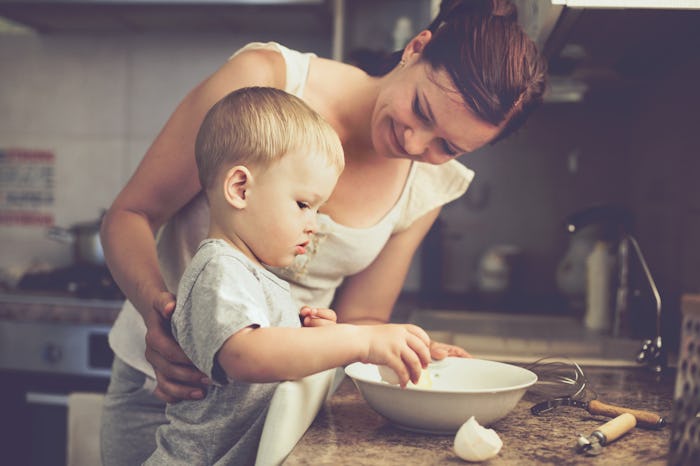Life

11 Ways To Avoid Being An Overprotective Parent
Growing up, I was the kid with the overprotective mom. There were so many things I wasn't allowed to do that I lost count. Everything from playing softball to baking cookies was off limits due to the potential for harm in one way or another. At a very early age, I vowed that if I ever had children, I would find all the ways to avoid being an overprotective parent. My heart saddened at the thought of my kid staring out the window watching the other kids have all the fun. I would be different than my mom — I would let me kids have all the fun.
But when my kids came along, giving them freedom and autonomy wasn't as easy as I had once imagined. It started from the moment they were born. Keeping my babies safe and helping them solve problems seemed like the best thing I could do for them. And allowing them to do things one their own didn't become any easier, no matter how many birthdays passed. But deep down I knew that hovering too close and trying to keep them in a bubble would ultimately do more harm than good.
Finding that sweet spot — where you feel your children are safe, but you're not being overprotective — comes with much trial and error. But the important part is that you keep trying. To steer clear of overprotective parenting traps, try using these 11 ways to empower you kids and help them be independent.
1Understand The Difference Between Risk And Risky
Most parents with overprotective tendencies have the best of intentions: to keep their child safe. However, as Lenore Skenazy, author of Free-Range Kids: How to Raise Safe, Self-Reliant Children Without Going Nuts With Worry, told Real Simple magazine, knowing the difference between risk and risky than can help hovering parents.
The example Skenazy gives is riding a bike. Every time your child rides her bike, she risks falling and being hurt. That's risk. But riding at night with no reflectors or helmet is risky. Teaching kids to eliminate risky behaviors helps to keep them safe and is better than not allowing them to participate at all.
2Practice Safety
If you're worried your child will make decisions that stand in the way of their safety, try practicing safety skills with your child before letting them try things on their own, suggested Parents magazine. Learning how to properly use playground equipment and ride a bike safely, will give your child the tools they need to enjoy these tasks independently.
3Breathe Deep
Usually, it's the parents who are more nervous than their kids. Try a simple breathing exercise to calm your nerves and focus your mind so you can support your child in taking risks without melting from panic.
4Provide Kids With Life Skills
As hard as it can be to let go, in doing so, you are giving your child valuable lessons to help them in life. According to Psychology Today, letting kids have independence teaches them competence and shows them that they are capable of making things happen without them help of mom or dad.
5Let Them Be Fun Finders
Overprotective parents make a habit of controlling their child's environment to the point of impediment. But as Today's Parents pointed out, kids should be made to find their own fun. Send them outside and let them create games and activities with their own imagination.
6Stop Obsessing
If your worry meter is running 'round the clock, the constant anxiety isn't helping your child (or you). Releasing negative thoughts about your child's future as well as not looking for evidence to back up your fears will help overprotective parents stay on a healthy track, according to Empower Parents website.
7Be Honest About Fear
It's OK to tell your kids why you're worried about them getting hurt, or having something bad happen to them. As Parents pointed out, when kids see parents struggle will help them see that all people have fears to deal with in life.
8Introduce Dangers
In his TED talk titled "5 Dangerous Things You Should Let Your Children Do" computer scientist Gever Tulley encourages parents to let kids use pocket knives and start fires. The foundation for his argument? Learning to control these things — using proper safety — kids will learn and be empowered in a meaningful way.
9Teach Problem Solving
Much like reviewing safety measures, teaching kids problem solving skills can encourage them to be independent. As Psychology Today pointed out, children can't always rely on parents to fix their problems. Teaching them to resolve conflict and work through problems helps build resilience that will stay with them into adulthood.
10Avoid Peer Pressure
If you are trying to break your overprotective ways, avoid spending time with other parents who are overprotective. Watching them swoop in to their child's side every minute may make you relapse into your old ways.
11Surround Yourself With Like-Minded People
Just like you want to avoid other helicopter parents, you want to find friends who are good examples of letting their children have more freedom. Surrounding yourself with moms allowing autonomy and independence will reinforce what you know to be right and help you feel supported in your decisions.